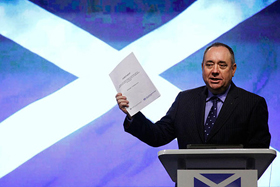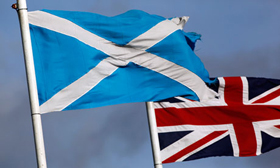Prospects for Scottish Independence
In
Login if you are already registered
(no votes) |
(0 votes) |
Interview
The referendum on Scottish independence, planned for autumn 2014, has attracted a great deal of media attention both in Europe and further afield. Many experts believe that if Scotland were to gain full independence, it could create a “domino effect” provoking other stateless nations to secede from their respective states. David McCrone, professor of Sociology at the University of Edinburgh, gives his analysis of the situation, and talks about the prospects for Scottish independence, its impact on Europe and beyond.
Interview
The referendum on Scottish independence, planned for autumn 2014, has attracted a great deal of media attention both in Europe and further afield. Many experts believe that if Scotland were to gain full independence, it could create a “domino effect” provoking other stateless nations to secede from their respective states.
David McCrone, professor of Sociology at the University of Edinburgh, gives his analysis of the situation, and talks about the prospects for Scottish independence, its impact on Europe and beyond.
Interviewee: David McCrone, Professor of Sociology and co-director of the Institute of Governance at the University of Edinburgh
Interviewer: Nikolay Markotkin, RIAC
Mr McCrone, how strong is, in your opinion, the popular support for independence in Scottish society?

Professor of Sociology
and co-director of the
Institute of Governance
at the University of
Edinburgh
We have been carrying out surveys now for more than a decade, asking people about independence as opposed to the current situation of devolved domestic powers. And the answer is around 30 percent, it is between 25 and 30 percent on that question, which is, of course, some way short of a 50 percent majority. However, if you ask a slightly different question about whether, for example, the Scottish parliament should make all decisions relating to Scotland, that rises to 35 percent. It depends clearly on how the question is worded.
The other thing, of course, is that what is called here “devolution max”, that is the greatest devolution of powers to the Scottish parliament, notably over taxation and welfare policy, which currently are reserved to the Westminster government. The significant majority of people wish those to be under the control of the Scottish parliament. So you face a situation when, let us say, one third of people are in favor of independence. One third of people want a much more powerful parliament than we have at the moment, which, of course, leaves the remaining third of those who either do not want parliament at all, or are happy with the one we have at the moment with simply control over domestic responsibilities. That is around a quarter of people. So it is not a straightforward “yes” or “no.”
Do you think it is possible that the majority of Scots will vote for independence in 2014?
It is possible, but I would say at the moment it is not probable, because they have to get 50 percent plus one. And given that at the best, a third of the population backs independence, it is therefore unlikely. But referendums are notoriously difficult to predict, because a question on one topic, such as the constitution, will inevitably draw on other issues.
Let us assume that the Scots vote for independence. Will the British parliament approve this?
Well, that is interesting because the whole negotiated process between the Scottish government and the Westminster government agreed that the Scottish parliament would have the final say in this process, so Westminster gave the Scottish parliament the power to hold a referendum. Therefore, it would be highly unusual if the British Government then went back on its promise to do that. They have ceded responsibility to the Scottish level of government, and therefore it will be very difficult for them to change their mind. If there was a “yes,” and that is a big “if,” although the referendum is 18 months away and a lot of things can happen in 18 months, especially since the UK government is deeply unpopular in Scotland, then it would be almost unthinkable for the UK government to go back on its promise to honor a referendum.
In other words, if Scotland voted “yes,” then the whole process would begin withdrawing or seceding from the British Union. It may take some time; it would not be at all easy or straightforward because Scotland has been a part of the United Kingdom for more than 300 years.
As with negotiating any kind of divorce arrangement, it can be very difficult, very emotional: who gets the furniture, who gets what, and then the issue of the debt, whose debt is it really and all those sorts of things. You may recall in the early 1990s there was the so-called Velvet Divorce between what is now the Czech Republic and Slovakia. It is now known as the Velvet Divorce, because it was all done relatively peacefully, but I think this situation was quite unusual in that regard, particularly after the fall of communism in 1989, so it is not a strict parallel.
The process of Scotland’s secession would be difficult and spread over a long period of time, but the British parliament would have no option but to begin to negotiate the process, so it would have to happen. In the end, the United Kingdom has only existed for 300 years. Moreover, in its present form, it has existed for less than a hundred years, because in 1921 a large part of Ireland became the Irish Republic and broke away from the United Kingdom. So the United Kingdom in its present form is less than a hundred years old. So it is not at all impossible or unthinkable for another part of the United Kingdom, in this case Scotland, to leave the United Kingdom. And the United Kingdom would, of course, be smaller than it hitherto had been.
Scotland has a population of 5 million people, which is roughly the same size of population as Denmark, somewhat bigger than Norway, somewhat bigger than the Republic of Ireland, but it is 5 million people out of a population of around 60 million, and England represents about 50 million people. So Scotland is a tenth of the size of England in population terms. It is a much smaller aspect of that, but it is perfectly feasible for Scotland to be an independent state. Whether the people of Scotland think it should be is, of course, another matter entirely.
If Scotland becomes independent, will it automatically enter the European Union? What is the EU position on this?
There is debate and argument around this issue. For example, the European Commission in Brussels has said: “No, Scotland will have to leave the European Union and then re-apply for entry.” This is a legalistic position, whereby Scotland would no longer be part of the United Kingdom and therefore would have to renegotiate entry. There are a number of aspects that make this position problematic, one of them is that there is a historical precedent for a state remaining within the European Union, even although it is not the state that negotiated entry. I am thinking here particularly of Germany. When Germany became part of the European Economic Community, it was, of course, West Germany. And the reunification into today’s Germany created a state that had not signed the Treaty of Union.
Of course Germany is so important to the European Union that it was unthinkable for Germany to leave and then be forced to reapply, even though in strict terms the reunified Germany was not the Germany that had applied. So when it comes down to it, it is an issue less of law than of politics. And if, for example, the European Union decided that Scotland was not a member of the European Union, it would be turning its back on a country with a very large volume of oil deposits, with control over the majority of fishing in the European Union and in economic and political terms, I think it would be very difficult, but, as I say, it is politics rather than law.
The other thing that makes it interesting and different is that the British government claimed until very recently that “No, if Scotland became independent then Scotland would no longer be a part of the European Union.” And then about three or four weeks ago the present conservative-led government announced that it was proposing to hold a referendum on the United Kingdom’s membership of the European Union. So it is totally bizarre: at the same time as saying: “No, Scotland would have to leave, that’s how it is” the government was saying “No, United Kingdom is going to leave, or maybe leave,” and therefore, as we say here, it shoots itseft in the foot.
Of course, the Conservative Party’s renegotiation of the country’s European Union membership is a political move. And anyway, the European Union is in the midst of some difficulties at the moment in terms of its full relationship with Eurozone countries. In other words, that is a very fluid situation.
So Scotland would not automatically have the right to enter the European Union. My own personal view is that it would be very foolish and stupid for the European Union to throw Scotland out, because it has a much better economic position and control over oil and fishing and the rest, than many current members of the European Union. Of course, the European Union has a long history of saying one thing and doing another or changing its mind and saying: “No, we have to change our mind, circumstances have changed” and so on.
You could find yourself in a rather ironic situation of Scotland remaining within the European Union, while at the same time the rest of the United Kingdom leaving the EU, with Scotland simply taking the place of the rest of the UK. This would be a wonderful piece of irony in terms of the politics of Europe. Especially as Cameron’s government is deeply Euro-skeptical, actually Europhobic, and a clear majority of its Members of Parliament and the Conservative Party, which is the bigger of the two coalition partners, wish the United Kingdom leave the European Union. And that is why Cameron entered into this rather rushed promise to hold a referendum on any changes that he happens to negotiate after the next election in 2015 assuming, and this is a big assumption, he will still be in power. So it is all politics.
Can you imagine a situation in which either UK government or, for instance, the Spanish government, could veto Scotland entering the European Union?
Yes, it is possible. Because the Scottish question is the question of a “stateless nation,” i.e. is a territory that breaks away from an existing member state, there might be what we would call it a problem of infection. For example the Catalans in Spain, would say: “Well, the Scots have gone and we will go too”, and Spanish government would veto it. But if you go to the position of the Spanish government vetoing Scotland becoming part of European Union, well, that is another ball game. And anyway, one of our nearest neighbors, Norway, is not in the European Union has substantial oil deposits and also control over fishing, and that is a direct parallel with Scotland. So you can imagine Scotland being outside the European Union, but being like Norway which has negotiated some kind of relationship with the European Union. So if the UK government or, indeed, the Spanish government said: “No, Scotland would not be in the European Union”, would that make any difference to Scotland’s economic position or to its dealings with the European Union countries? Probably not.
If Scotland becomes independent, will it serve as a precedent and create an impetus for other stateless nations, such as Cataluña, the Basque Country, and Wales, to follow its lead?

First Minister of Scotland Alex Salmond said
it was 'game on' for the independence
referendum
Well, I know that people talk a lot about parallels here, and the domino effect. But I am not a great believer in the domino effect in this sense. It is a general issue of states in the world today, which are far less straightforwardly homogeneous than they were in the past. And that is true for Russia, the United Kingdom, Spain, France, and Belgium, and Canada, and wherever you look. There are lots and lots of understated or stateless nations or whatever we want to call them, territories which have a level of economic development meaning that, if they were independent states, they would be very influential. Some countries are small and independent, some countries are small and not independent, and so the global situation is not at all straightforward.
I am sure if Scotland became independent, the Catalans, Quebecois and the others would say: “We want what they have got,” but the real negotiations would take place within their own states, so the Catalans and the Basques would have to negotiate in the context of Spain, and that is a very different political, economic, cultural situation. The one difference between Spain as a state and the United Kingdom as a state is that the Spanish state has a very strong centralized and centralist tendency which means that, if Cataluña left Spain or both the Catalans and the Basques left Spain, then what would be left of Spain? And there is a strong centrist position, which is a strong central authority. This goes back to the dictatorship of Franco and before, while, in the United Kingdom, there is nothing equivalent to that. If Scotland became independent, England, the biggest part of the country would simply go “Well, there we are.” Moreover, historically, parts of the United Kingdom such as Ireland, left, and it did not fall apart. You could imagine Scotland leaving the United Kingdom and it will still remain, but you might have a situation where eventually – I don’t think Wales would become independent very quickly – but there might be a situation where the United Kingdom simply becomes England. And England is home to 85 percent of the UK population. Many people make the mistake of calling the United Kingdom England anyway.
It is an error, but it is an interesting error. It’s not at all parallel but, there are similarities and allusions. For example, when the Soviet Union broke up and the whole history of the breakup of the Soviet Union – of what was Russia and what was not Russia, of which bits were independent or semi-independent. There are some interesting parallels, I would not go any further than that. What is a multicultural state and who are Russians and who are British, these all are common issues of the XXI century. They are not unique to those countries.
Once it happens, it is quite interesting. Will the Catalans follow, though not automatically? The other parallel is, of course, with the Flemings in Belgium, but then the Belgian state is, it seems to me to all intents and purposes so fragmented that de facto rather than de jure Flanders is autonomous. It is degrees of self-government that matter here, not whether the territories are or are not self-governing. Of course, Scotland has a high level of self-government and you could imagine it having even more control over its own affairs with regard to taxation and wealth policies and all sorts of things and still remain a part of the United Kingdom, although de facto heavily autonomous and quasi-independent. So it is not a “either / or,” as I keep saying, it is not a “either / or,” are you independent or are you not. It is a question of how much self-government you have and it is the question of moving the marker along the line, which is the continuum of self-government. And, of course, in the XXI century, one has to ask, what does independence really mean in an interdependent world? You can even argue that largest, most powerful countries in the world are not really independent anymore in a classical, XIX century sense of that term. The world has changed, it is not a world of creating nation states, this is XXI century. And the political, economic and cultural conditions of the XXI century are very different than when states were originally formed.
Mr McCrone, what do you think Russian-Scottish relations would look like if Scotland became independent, not necessarily in the near future but maybe in the distant future? Do you expect their relations to be friendlier than current Russian-British relations?
I do, actually, and I will tell you why. One reason is that there is a historic animosity, the old Cold War relationships between the East and the West and, above all, between the Soviet Union and the Western powers and the United Kingdom. So UK-Russian relations are, whether one likes it or not, colored by that experience. A small country like Scotland of 5 million people is, of course, far less threatening to a country as large and as important as Russia. And therefore it does present a challenge.
Historically, in the time of the Soviet Union we had links through the North Atlantic. I come from Aberdeen on the East coast of Scotland, and we used to see Russian boats coming in, fishing boats and others, which would come down from Murmansk and other ports.
The Russians, as a people, were a seafaring nation, like ours. And, of course, we have one other major thing in common: our national saint, our national icon is Saint Andrew, who, of course, is also the national icon of the Russian Navy. We have these links.
In addition, historically, under, for example, Peter the Great, we had soldiers and sailors from Scotland who became very important in Russia and helped to build the Russian state in the seventeenth-eighteenth centuries. There are historic links between our two countries, although Russia is much bigger than Scotland. Also, this is slightly strange, but last month we celebrated the life of our national poet, Robert Burns, and, apparently, Robert Burns has a big following in Russia. Robert Burns and his poetry “A Man's a Man for a' that,” that is people are to be treated as equals, even though in materials terms they are not - that is something that Russian people and Scottish people have in common as well. So we are culturally similar, historically we have had links. Scotland is far less of a threat, of course, as a small northern European country. And on that basis it would be much easier to foster good relations between a big country and a small country in the North Atlantic.
In which fields, in your opinion, Russia and Scotland could cooperate?
Well, that is an interesting question. I think, in the cultural field. We have a Scotland-Russia institute here, not far from where I am speaking to you from, at the University of Edinburgh. We have historically a link of cultural sorts. The Scots have always been a people who have found the world their oyster, as we say, they have used it as a way of extending power and influence and wealth and so on. And I am sure we would be interested in a wider world anyway. Materially, natural resource industry is enormous in Russia. But we have grown over the last three decades a very important global industry in oil development. And, of course, Scotland also is a major European producer of wind energy, so we are growing in renewable industry. We are a very windy cool Northern country. So we found this to our advantage, we use wave power and wind power, as well as our natural resources in oil and gas. So in those regards, in economic terms we have a lot in common with Russia, and we can benefit from shared understandings on how to do these things in the modern world. So economic terms and cultural terms, I think, those are two obvious and important fields in which Scotland and Russia could well cooperate.
(no votes) |
(0 votes) |






